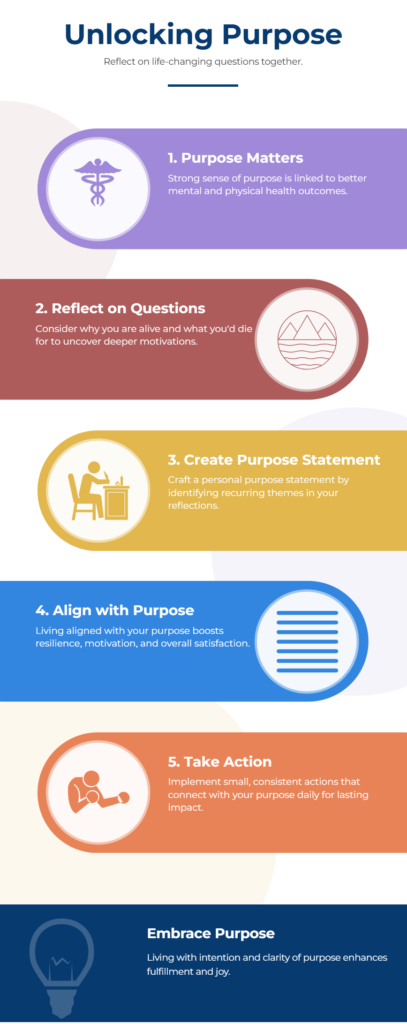Don’t miss a post. Click here to sign up for our free newsletter.
Estimated reading time: 7 minutes
Discovering Your True Purpose
Purpose. It’s a simple word with boundless depth, and for many of us, it is the ultimate quest in life. Discovering what truly brings us meaning can be one of the most rewarding yet challenging pursuits. Recently, I tuned into a thought-provoking podcast on happiness featuring Arthur C. Brooks, an expert on emotional fulfillment and well-being and author of Strength to Strength: Finding Success, Happiness, and Deep Purpose in the Second Half of Life. Brooks posed two deeply resonant questions that encouraged me to reflect on my own purpose, and they might just do the same for you.
The Questions That Change Everything
- Why are you alive?
- What would you be willing to die for?
These questions cut through the surface and invite us to venture beyond conventional, short-term aims like “making more money” or “achieving success.” They demand us to dig into what we value most and to confront a reality that might feel uncomfortable but could ultimately bring profound clarity.
In this article, we’ll take a deeper look at these questions, explore the science and psychology behind purpose, and delve into how living in alignment with our values can transform our lives. I invite you to consider these questions, share your reflections, and join the conversation.
Why Purpose Matters: Insights from Science
Purpose has long been considered one of the pillars of well-being. Research shows that a strong sense of purpose is correlated with numerous physical and mental health benefits. Studies from the University of Michigan and Harvard, for instance, suggest that having a defined purpose can:
- Lower the risk of cardiovascular disease: People with a strong sense of purpose tend to experience lower rates of heart disease and strokes.
- Enhance cognitive resilience: Older adults with a sense of purpose show slower rates of cognitive decline.
- Boost mental health and longevity: Research published in JAMA Psychiatry found that adults with a strong purpose were 50% less likely to suffer from depression and had higher overall life satisfaction.
These findings reflect a truth many of us have sensed intuitively: living with purpose doesn’t just make life more meaningful; it genuinely enhances our health and well-being.
Exploring the Questions: A Deep Dive
Let’s consider Arthur C. Brooks’ two questions and what they truly ask of us:
Question 1: Why Are You Alive?
This question can seem existential, even intimidating. But it’s a powerful tool for uncovering the intrinsic motivations behind our actions. Some people might find that their answer is tied to family, creativity, personal growth, or helping others.
Think about this question in the context of your daily life. How would you answer it without overthinking? Is there a cause, relationship, or activity that feels fundamental to your reason for living?
As you reflect, try writing down the first few things that come to mind. It may surprise you how clear or even unfamiliar your answers feel. This isn’t about perfection or a “right” answer; it’s about taking the first steps to define what brings you joy and energy.
Question 2: What Would You Be Willing to Die For?
This question pushes us even further into the depths of our values. It asks us to identify something so essential that we’d be willing to sacrifice our comfort—and perhaps even our lives—for it. For many, the answer might involve loved ones, justice, or legacy. For some, it may be their children, a moral principle, or a vision of the future.
This question isn’t meant to suggest that we should put ourselves in harm’s way. Instead, it’s about finding what holds that “ultimate” significance in our lives.
Developing Your Personal Purpose Statement
Now that you’ve started to reflect on these questions take the next step by shaping your thoughts into a purpose statement. A purpose statement is a guiding principle, something that can steer you back on course when life feels overwhelming or uncertain.
Your purpose statement doesn’t have to be complicated or grandiose. Here’s an approach to crafting it:
- Look for recurring themes: As you review your reflections on Brooks’ questions, look for themes. Do you notice a pattern around relationships, creativity, or social impact?
- Keep it authentic: Remember, this is for you. Your purpose should resonate on a deep level and feel like an honest reflection of what matters most to you.
The Impact of Living Aligned with Your Purpose
Once you’ve identified your purpose, living in alignment with it can become a life-affirming commitment. It isn’t a finish line to reach; it’s a framework for navigating everyday choices and long-term goals. Consider the following benefits of aligning your life with your purpose:
- Increased resilience: Purpose helps you recover from setbacks. When life gets challenging, having a reason that’s bigger than the immediate struggle can offer you strength.
- Enhanced motivation: Motivation becomes easier when you’re working toward something that truly matters.
- Greater satisfaction: When your actions align with your values, you’re likely to experience a sense of fulfillment and peace.
For example, if helping others brings you joy, try volunteering, mentoring, or offering small acts of kindness. These are not only meaningful but can also become a way to remind yourself of your purpose daily.
Research on Purpose: The Power of Personal Mission
Research conducted by Gallup and psychologist William Damon has shown that people who write down their mission statement report a 15-20% increase in daily motivation and life satisfaction. Interestingly, the clarity of purpose can also impact our work. Studies find that purpose-driven individuals are more engaged, focused, and resilient in professional settings.
If writing a mission statement feels daunting, start small. Write a single sentence on what you want to contribute to the world or to those around you. Refine it over time, allowing it to grow as your understanding deepens.
Taking Action: Small Steps Toward Purpose
Living with purpose doesn’t always require big, life-altering changes. Sometimes, small, consistent actions aligned with your values can be just as powerful. Here are a few ideas to start integrating purpose into your daily life:
- Prioritize relationships: If relationships are central to your purpose, set aside time for genuine connection with others.
- Engage in meaningful work: If making a positive impact through work is essential to your purpose, seek out tasks or projects that align with this, even if it’s within a larger role.
- Practice self-reflection: Regularly check in with yourself to ensure that your actions align with your purpose. Journaling or meditation can help keep you grounded.
Finding Purpose at Every Stage of Life
It’s also essential to recognize that purpose can evolve with time. What matters to you at one stage may shift as your life circumstances and personal growth journey change. Having the courage to revisit your purpose periodically can be as valuable as the initial discovery process itself.
Psychologists encourage us to see purpose as a journey, not a destination. Purpose is fluid and can adapt as we grow, taking on new dimensions and insights.
What Is Your Purpose?
To further enrich this journey, let’s turn this into a conversation. I’d love to hear your thoughts:
- How did reflecting on Brooks’ questions shape your perspective?
- What themes or values stood out to you?
- How has discovering or living with purpose impacted your life so far?
Please feel free to share your insights and ideas in the comments. Whether you’re just starting or revisiting your purpose, sharing our reflections can create a powerful community of purpose-driven people.
Discovering Your True Purpose
Discovering and living in alignment with our purpose is one of the most rewarding journeys we can take. In a world that often prioritizes surface-level success, taking the time to ask questions like “Why am I alive?” and “What would I be willing to die for?” can connect us with something much deeper.
Take a few moments today to reflect on your own purpose. Write it down, live by it, and don’t be afraid to revisit it as you grow. Purpose is not a fixed point; it’s a guiding light, one that we can nurture and refine throughout our lives. Let’s embark on this journey together and inspire each other to live with intention and fulfillment.
👉 Start today!
Check out The Seven Pillars of Sustainable Health and Wellness, an introduction to our overall wellness coaching strategy.
Subscribe to our free newsletter to receive more health tips right in your inbox, or schedule a free 30-minute 1:1 call for a personal consultation.
Discovering Your True Purpose | Cheat Sheet

